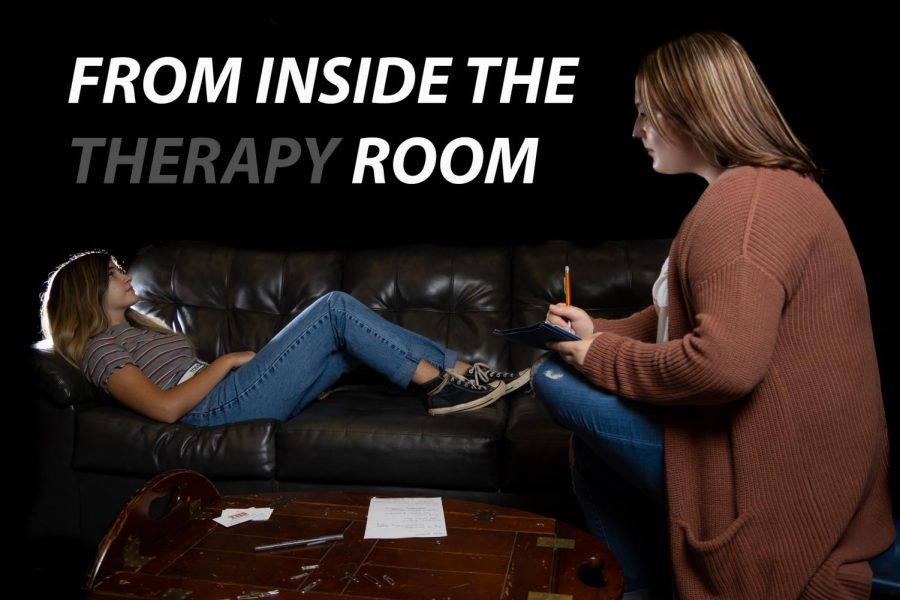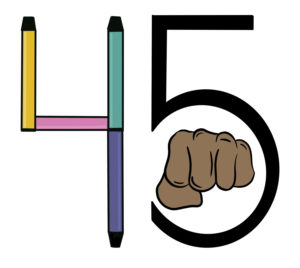Counseling boosts confidence and suppresses paranoia
photo illustration.
September 21, 2020
“Where are we going?”
I gawked in horror as the car inched closer to the big blue building ahead. I was riding shotgun, the best seat an 11-year-old could occupy, but being anywhere in the car was a punishment in that moment. Before I could react, my mom put the car into park, opened the door and ushered me to get out.
There was no way an inch of my body would leave the vehicle.
I peered through quaking fingers at the sign that taunted me from above. Etched in the sign was a word that had haunted me for the past six months. I had recently made many efforts to avoid this word, but ignoring it was no longer an option. It now stood right in front of me, and I had to read the word with my own two eyes. Sam’s.
My disdain for the grocery store probably isn’t what many would expect it to be. I wasn’t anti-capitalism, as I didn’t have any real political opinions until middle school. I wasn’t against its surprisingly good food court, although I do think buying pizza and baby wipes in the same building is a bit odd.
What I was against was a regime that was on the track to control Americans like a totalitarian government. A part of my gullible brain was convinced by shady internet forums that Sam’s, accompanied by its owner, Walmart, would end humanity by forcing Americans into concentration camps. For some reason the U.S. government was allegedly involved in this scheme. Googling the phrase “Walmart FEMA camps” sucked me into a rabbit hole no amount of horror movie binging could prepare me for.
As I explained this hair-brained conspiracy to my mother as to why I can’t go grocery shopping, she let out a “disappointed but not surprised” sigh, and I waited in the car while she entered this devilish bulk store. She thought this phobia would soon fade away, but it persisted.
We eventually decided that only one thing could ease my paranoia: therapy.
Once again, with the same fear that the Sam’s parking lot struck inside me, my mom stuffed me into the car for that dreaded first appointment. While it was nowhere as frightening as fresh produce ailes, I felt out of place stepping into that magazine littered waiting room.
I really was out of place. Not to brag, but my life has been pretty great. I am the straight, white, only child to two equally straight, white parents. I’m a Christian in a small town in Texas where there’s a different church at every stoplight. I’ve never experienced anything that could be considered “traumatic.” For these reasons, I scoffed at the idea of therapy. Booking an appointment felt like a disservice to those who “really needed” it.
This guilt grew when, prior to that first appointment, I had to fill out a piece of paper that allowed my therapist to know my deepest secrets before knowing what I looked like. The instructions on the paper were simple. I was to read a list of statements and indicate which ones applied to me.
Some of these sentences I completely identified with. I am definitely anxious and debatably depressed. As shown by my many irrational fears, my paranoia can go to embarrassing extents.
However, as I went down the list, I started to identify less and less with the paper’s questions. It asked me if I had any suicidal thoughts. Being too afraid of death to even lay scissors near my skin, I have never seriously contemplated ending my life.
The questions got more unrelatable from there. Other sections asked if I hear voices or have shown extreme signs of OCD. While there is no shame whatsoever in checking these boxes, they made me wonder why I bothered filling out this questionnaire at all. If I didn’t have symptoms that could land me in a psych ward, it felt like therapy was a waste of my precious, privileged white girl time.
Regardless, as I began visits to that fateful office, I was able to dive into my own problems, even as trivial as they are. The more I go to therapy, the more I realize how little I speak outside of those monthly visits. I’m quiet by nature. Silence is my natural state of being, but therapy has forced me to speak.
My first visits were of multi sentence questions from my therapist and one word responses from me. My vocabulary in that room was limited to “yes,” “no,” and “good,” none of which were overly helpful in my personal growth.
My first visits were of my eyes refusing to make contact with the other person in the room. They were anxiously entranced by the floor, ceiling, chairs, basically anything unable to stare back at me. Those couldn’t judge me. The woman with a notepad and a psychology degree could.
My first visits were stiff and base level, and this fact is completely my fault. As I’ve said before, speaking, whether to a stranger, family member or friend, is no small feat for me. These meaningless meetings of shivering hands and uneasy stomachs ceased to exist after one realization: This is the one person in my life who is legally obligated to not repeat a word I say. Seeing this as a very rare opportunity, I opened up.
In the realm of social skills, therapy is a nice conversation starter. If you drop the name of your therapist around friends, their reactions may surprise you. It’s not uncommon for me to meet someone I share the same counsellor as. Often, if a friend has the same therapist as me, I will simply refer to her by her first name. She’s such an integral part of our lives that we need only address her by her by one name.
Therapy has made me more comfortable in my own skin. Although the counsellor’s office is typically as comfortable as can be, the waiting room is a different story. I have run into many random acquaintances while twiddling my thumbs until my time has arrived.
With time, I have learned to laugh these occasions off, but as awkward as it can be, it reminds me that everyone has their own reason to sit in those stereotypical therapy couches. Everyone has their own fear, concern or quirk. The only difference between me and those who don’t seek treatment is that I can better my mental health by talking to someone who listens, even if it’s just one appointment at a time.





















